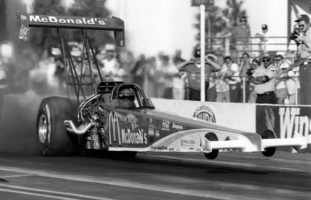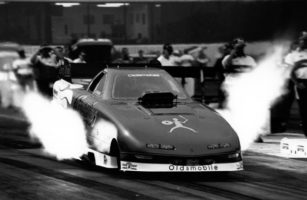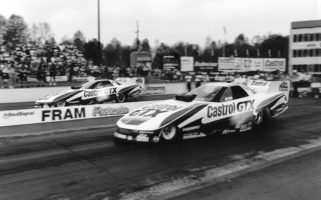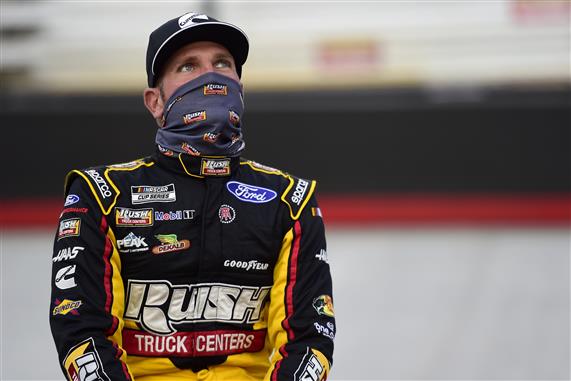In this week’s edition of “First Seasons,” Speedway Media talked to former NHRA driver and now, FOX TV analyst, Tony Pedregon, who details his first few years of entering the NHRA.
During the interview, Pedregon discusses entering the sport on a part-time basis and how he made connections along the way. He also shared his memories of his first start, his first victory, how he came to drive for John Force Racing and other aspects of his early career.
SM: You made your NHRA debut at the age of 27 toward the end of the ‘92 season and of course, the ‘93 season. How did you make the connection to run with Larry Minor? Was it with the help of your brother, Cruz?
TP: “I think there was definitely some influence there,” Pedregon said about driving for Larry Minor. “I had been driving an Alcohol dragster for a guy named John Mitchell. Not only that, but the relationship Cruz had with Joe Pisano, who owned pistons and he (Cruz Pedregon) had been driving for him. I think Larry (Minor, Team Owner) had mentioned to Cruz, he was thinking about running a backup car.”
“When the deal came together, it just seemed like independent cars and Larry was a guy who wasn’t just an owner, he was a former racer. I had experience and I think things were going well with Cruz, and he was considered younger for our sport, and I think that’s what opened the door.”
SM: What was it like making your professional debut during those days of NHRA, considering it was still a sport dominated by veterans?
TP: “That was the goal for us, when we were growing up, we were obsessed with drag racing in particular,” he said. “It all moved pretty fast. When I started driving the Alcohol car, that was a big achievement, and it didn’t seem that long where I was driving for two years. And during those two years, I didn’t have too much success.”
“I think (Larry) Minor knew enough about racing and had a good enough experience with Cruz. I think the connection between Cruz and Larry was a good connection, and that Cruz always had the right attitude, right demeanor. I think those were good traits. Our parents taught us to be very respectable. Those traits were important to Larry and I think he was willing to take the chance.”
SM: Prior to your debut in Top Fuel, did you feel as though the experience in the Alcohol dragsters helped you to have a smooth transition to the Top Fuel class?
TP: “I didn’t realize it at the time, but I had enough experience,” Pedregon said about making the professional leap. “Competition is competition, and I didn’t really understand it then, but I did after several years as a professional. I realize that I had adequate experience in competition, and even going through the tough times at some of the regional tracks to not qualify.”
“So, I had very little success, but in trade I also had some success in an Alcohol car. Those were invaluable lessons and the time that it allowed me to transition, because the opportunity was there. When that opportunity comes along for people, you can botch it, but fortunately I didn’t because I had some experience.”
“I see drivers come up now who jump straight into a Nitro car, it’s a tough transition. Jumping from an Alcohol car to a Nitro car is a great experience for a driver who wants to race professionally in NHRA, and fortunately I was able to be one of the lucky ones to make that transition in my career.”
SM: At the end of the ‘92 season, you made your first career professional Top Fuel start at Pomona and you qualified for that event. Discuss what it was like in the weeks leading up to your first start professionally. Were you anxious or nervous? Or was it more, ‘let’s get this thing going?’
TP: “I felt more nervous, not necessarily anxious, as there were a lot of distractions,” he said. “Our family was there at Pomona, friends were there and I wanted to completely separate myself from that because that can be a distraction. I never really took to the social part of it (racing). I remember everything happening faster than I would have liked but I think that’s what happens when you’re on a big stage in NHRA.”
“I remember that I wanted to do everything perfectly and I was working on the car at the time. Despite that, I heard a lot of positive things about Larry Minor in the previous years. I always thought he (Larry Minor) treated me a little differently because it was his pet car. Some of the things I had heard about him were influential but he wasn’t tough on me, he was actually very supportive. And that was very helpful.”
“Of course Cruz (Tony’s brother) was there. He walked over and gave me some pointers, and I felt that’s all I needed. I felt I was comfortable being surrounded with all the right people.”

SM: Jumping ahead to the ‘93 season, you would run on a part-time schedule. Was it hard managing those expectations as a driver?
TP: “For sure, it was,” Pedregon said. “That’s when I was starting to figure out it wasn’t going to become a reality unless I went to work on the marketing. It was a much different scale and scope starting out in trying to find some support to run a few races. Networking is a part of that, you have to make sure you connect with the right people. The financial support is a majority of that, but there are still individuals who have the resources and those people enjoy it. Fortunately, I was able to connect myself with the right people.”
“I remember in ‘93 and ‘94, I was just happy to be doing it (racing). I didn’t have any high expectations. (Those expectations) would have been nice, but the expectations were to do as much as I could. At the time, the expectations weren’t to be a professional, win a lot of races, there was none of that. The timing worked out and there were some opportunities, and that was the motivation.”
“I enjoyed doing it and it was very interesting to learn about the cars. I was able to at least promote some product and work on the car. That was one of those things you would bring to the table of the sponsor, as there were a lot more drivers than cars. Just understanding the car was something I learned as time went on.”
SM: The first race you ran that season (1993) was the Winternationals at Pomona where you qualified 14th and beat Jack Ostrander in the first round, but ultimately lost to Kenny Bernstein in the second round. What do you remember about that specific race and could you have done anything differently to beat Bernstein in the second round?
TP: “I’ll never forget that race because we were happy to qualify,” he said. “When you drive for someone like Larry Minor, the car was more equipped than Ostrander, so in trade it probably wasn’t the best car for him. I actually beat him (Ostrander) on a hole shot. So, his car actually ran quicker, but what I remember most was in the staging lanes. Cruz was coming up to me, and he was kind of leaving in the car, and he said ‘okay. You’re younger and quicker than this guy, you know all those things.’
“It was just something that was very memorable to me. The thing I believe that made me successful as a driver, was the fear of failing. I just remember that was the last thing I remembered before we got pushed to the lanes. There’s just something that’s a little intimidating by having that opportunity (to race) and being younger, and seeing all these massive people in the grandstands. But, to see the smile on Larry’s face, that pretty much summed it for me. I was just happy to put a smile on his face.”
“When we raced (Kenny) Bernstein in the second round, it was all or nothing. He was a fierce competitor. I think Bernstein had a few times in his career, where he was unbeatable. So, losing to him wasn’t a big deal.”
SM: Throughout the next few years, you would run off and on before making the jump to Funny Car (NHRA’s highest class). What were you doing to help stay involved during the sport when you weren’t racing before making that jump?
TP: “In ‘94, I only drove for a few races,” Pedregon said. “Larry Minor was still involved, but he was really tied up with his two cars. I think he was under a lot of pressure. I always understood that Larry had a business, but he made sure to stay involved when I was not racing.”
“The guy I was driving for in ‘94, I think Larry provided an engine and some of the parts. Though I think that really set the stage for ‘95 because the McDonald’s sponsorship went away to Joe Gibbs and losing the sponsorship left Larry with pretty much nothing. Cruz and Cory McClenanthan went to drive for Joe, and who could blame them?
“So, he asked if I was interested in driving a Funny Car. I didn’t question him and took the opportunity. Even though it was tough on him losing Cruz and Cory, that opened my door to Funny Car. We had some success and in ‘95 at the Indy race, I blew my body off and burned my eyebrows.
“When I made my first Funny Car start, I had no one to look to give me advice. When I first tested at Phoenix, I had to strap myself in the car, rather than someone else. I felt claustrophobic. I was uncomfortable and too tight to reach all the controls. During that moment, I felt it (jumping to Funny Car) was a mistake. But, after the burnout, the checkout pass, I knew it was somewhat going to be okay.”

SM: Your big break eventually came in 1996 when you ran full-time for John Force Racing. How did that deal come together and do you recall the first time meeting John?
TP: “What started that whole thing, I was reading an article in Speed Sport magazine and Larry’s time in the sport was coming to an end in ‘96. I read this article in Speed Sport, and it said, John Force was going to run a second car, but it also said he was going to hire Ron Capps. I’ll never forget saying to Cruz, that’s the perfect experience for me and that I ran in a Funny Car, had the experience.
“I called his office (John Force) every other day. There’s two sides to this story. Larry Minor was pushing for me and he told John he would give him his left-hand trailer. Larry was telling John, he would give him a good deal on the trailer since John was interested in the trailer.
“I didn’t really know it, but I was calling John every other day. I was very persistent for two weeks and I all wanted to do was throw my name in the hat. I remember his daughter (Adria) in the background used to answer every call to the point she knew it was me. She tried to put her hand over the phone, and said, ‘Dad, it’s Tony Pedregon again.’ I remember him saying if he’s (John) hiring based on who calls the most, tell him (Pedregon) he’s got the job. But, I don’t think it was that. Larry was pushing me for the ride and Ron Capps had gone to Cruz, and he (John) couldn’t get a hold of him (Capps). I think that was the opening for me.”
SM: In that same year (‘96), you won your first career race in NHRA at Atlanta in 1996 against John Force. What does that victory still mean to you and did you ever think it would come against Force?
TP: “Well, I’m just happy we won,” Pedregon said. “It was relatively early in the season, and I was hired to help John win, that’s no secret because John promoted that. I don’t think the idea going into that final round was for me to win. John was outperforming my car by a tenth of a second. When we got to the final, his cylinders quit firing. So, the race went from John outperforming us, to being a tenth off of what we were running.
“I remember expecting him to drive around me. When I was at half-track, I was probably glancing over (to see if John’s car was there), but the car never came. Instead, I saw a win light and I remember thinking that (victory) wasn’t supposed to happen. So, there’s a turnoff, where you can use the parachute at the start/finish line, or the one at the end of the track if your parachutes don’t work and that was the last resort I took (because my parachutes didn’t work). I thought, think fast, and I wasn’t prepared for it, as I didn’t know what to tell him (John) or the cameras when they came up to interview me and I was caught a little flat-footed.”

SM: What was the conversation like after the victory between you and John?
TP: “I remember, we had dinner that night, and I told John ‘it’s money in the bank. You created another winner.’ I don’t know if he took that well based on his expression, but that was the natural competitor John was. I don’t think he realized then he made a transition from Team Owner/Driver to Multi-Team Owner and Driver.
“I just remember the diner where everyone was really quiet and you’re trying to enjoy it. I remember feeling like we did something wrong, but I wouldn’t have it any other way.”
SM: You finished second in the points standings that season. Is there anything you could have done differently to help better your finish?
TP: “No, there was no stopping John,” Pedregon said. “That team and chemistry, and what he had in ‘96, he had a group of core people that made his group so successful.”
SM: I asked Ron Capps this question and he says his favorite Wally is always his last one. What would you say is your favorite Wally in your collection?
TP: “It wouldn’t be the first one at Atlanta,” he said. “Mine would have to be my first win as a Team Owner and when I was driving. When I look back on that, I beat John (Force) in the final. It wasn’t because it was John, it could have been anyone. I believe it was the final in Reading in ‘05, and I was starting to wonder if I was ever going to win a race again.
“I just remember at Reading, we both smoked the tires at the finish line, and that just answered the question. I can win and I’m going to win. So, out of all those wins, the Reading one stands out the most.”
SM: Some racers have a memorabilia collection and some don’t. Are you a driver that collects your own merchandise, and if so, what do you have in your collection that reminds you of your rookie season?
TP: “I have a glass case with a burnt pair of gloves,” Pedregon said. “Those were from the fire I had in ‘95, and those gloves were so burnt, it looks like my hands were still in them. I have them in my case, and I look at those. I never realized it, but when I look back at all the highs and lows of what it takes to be successful is a tough road to get there. There were some pretty tough days.”
SM: Wrapping it up, it’s been 28 years since you made your first NHRA start. What would a 55-year-old Tony Pedregon tell a 27-year-old Tony Pedregon, if time travel was available? Is there anything you would do differently?
TP: “The funny part is getting him (27-year-old Tony Pedregon) to listen,” he said. “I think I would tell myself, to just be patient.”
Throughout Pedregon’s career, the Torrance, California native has earned two Funny Car Championships that occurred in 2003 and 2007, winning a total of 43 races, and having collected 76 career Final Rounds. After retiring from racing in 2015, Pedregon moved over to FOX Sports to serve as an analyst for all NHRA races.
Fans wanting to learn more information about Pedregon can like him on Facebook, follow him on Twitter and Instagram.
Special thanks to Allie Bland of NHRA for helping out with this interview and Tony Pedregon for taking the time out of his busy schedule.







